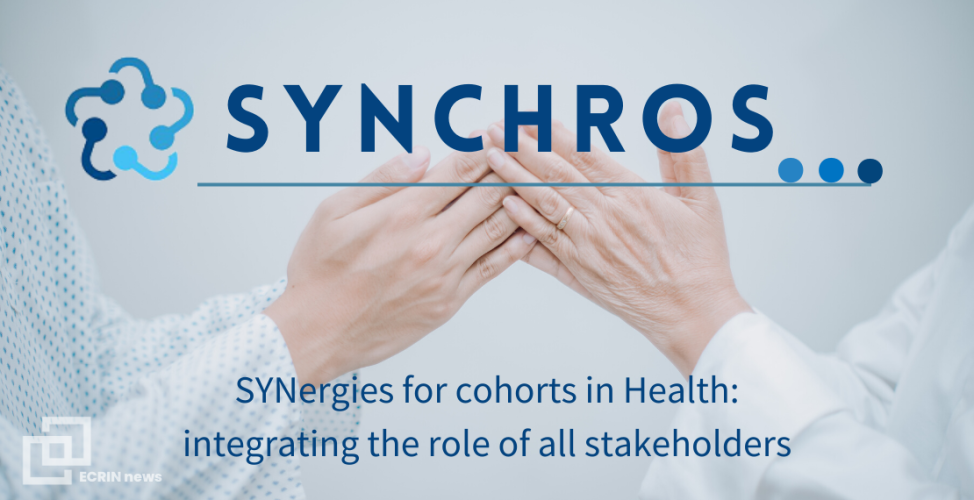SYNCHROS: Setting priorities beyond the end of the project

In June 2022, after 42 months of extensive work from the 11 consortium partners, SYNCHROS (SYNergies for Cohorts in Health: integrating the Role of all Stakeholders) is coming to an end. Some of its key outcomes include the development of the SYNCHROS repository inventorying European and international population-based cohorts, patients' cohorts and clinical trials (available at https://repository.synchros.eu/), identifying multinational initiatives to harmonise and integrate cohorts and infrastructures that can provide support for the integration of cohort data, providing a repository of European/international communication technologies (including social media) used in population-based cohorts, patients' cohorts, clinical trials and two policy briefs that were discussed with a wide variety of stakeholders: The first strategy brief focused on harmonisation and integration methods, and analytic approaches to maximise the value of cohort data. The second strategy brief tackled practical, legal and ethical issues in the optimisation of cohort data. The lessons learned from all the project tasks have been crystallised into a Strategic Agenda which was discussed on the 2nd of June with policy makers, funders and other stakeholders during the SYNCHROS final conference in Barcelona.
Some sustainability priorities raised by the consortium include:
· Providing a harmonised legal and ethical framework for access to and integration of cohort data
The GDPR aimed to bring this harmonisation to the European Economic Area but in practice, it has created a rather fragmented landscape, as it has left room for national derogations. As a result, researchers are more hesitant to share their research data in cross-border settings. Clarifying the legal and ethical framework for international collaborations should also be a priority. In July 2020, the European Court of Justice issued the Schrems II judgement with significant implications for international data sharing. In practice, it is unclear to the majority of the researchers how they can share cohort data with international consortia within the current legal landscape. In this sense, providing workable definitions of the terms “anonymization”, “pseudonymization” and “de-identification” becomes critical as these terms can come with different legal and technical implications (e.g. USA where the HIPAA governs data protection versus EU where GDPR governs data protection).
· Providing sustainable funding and improving synergies between projects and initiatives
EC projects have a limited lifetime with no guarantee that the partners will be able to secure funding to continue working on the key challenges identified. Funders should ensure that strategic issues in cohort research are addressed by providing adequate future funding or considering long term funding when relevant. Improving the synergies of projects and initiatives working on similar or complementary goals should also be a priority.
· Providing incentives for data sharing
Policy makers and funders should provide the "carrots and sticks" needed to make data sharing a reality. For example, they should push for the uptake of agreed core variables in future cohorts that they fund and look into attributing appropriate scientific valorisation to data sharing activities, in a similar way that publishers currently try to valorise peer reviewing of manuscripts. Sharing cohort data requires significant time and effort by the researchers, so it should be in addition to valorised, properly budgeted.
· Involving patients and citizens and building trust
The attitudes of the general public towards data sharing can vary dependent on the type of research conducted, by whom, where and so on. We need to re-establish trust between research participants, the general public and the researchers. To maintain this trust, transparency on the researchers’ side is the key. Researchers need to be clear on the objectives of their research and how the collected data will be handled and shared.
· Creating and maintaining a diverse international stakeholder community
Citizen science is now a movement gaining momentum and the same is true for data acquired with wearables and applications of AI and machine learning. Leaving room for adaptability and flexibility is critical as new technologies are continuously changing the way research is conducted. We should make sure that there is an active, inclusive, international stakeholder community that constantly works on developing mechanisms to follow this rapidly evolving landscape.
· Training
The importance of constant training cannot be highlighted enough. Both researchers and research participants should have access to training in order to better understand: the scientific state of the art and methodology, ELSI, the FAIR principles, and implications for using a centralized versus federated infrastructure for the integration of the cohort data, and so on.
SYNCHROS, a CSA, will rely on its stakeholders to sustain its actions and implement the solutions identified.



